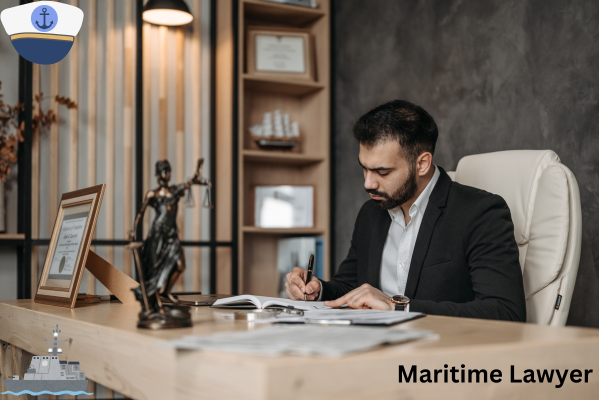Maritime law, also known as admiralty law, is a subfield of law that deals with private maritime disputes and nautical issues. Shipping, navigation, waters, insurance, canals, and even piracy are all covered by this branch of law. A maritime lawyer is a specialist in maritime law who provides essential services to people and businesses involved in maritime activities.

What is the History of a Maritime Lawyer?
The starting points of maritime law can be traced back to old human advancements, for example, the Phoenicians and the Greeks, who developed early guidelines to oversee oceanic business and routes. Over hundreds of years, these regulations developed and impacted by different societies and global exchange elements. The medieval laws, such as the Rhodian Sea Laws and the Laws of Oleron, that served as the foundation for contemporary admiralty law are heavily influenced by the modern framework of admiralty law.
What is the Scope of a Maritime Lawyer?
Understanding the extent of maritime law requires recognising the admiral’s law and maritime law, albeit these terms are frequently utilised reciprocally. While Admiralty law covers both oceanic and inland waters, the traditional focus of maritime law is on ocean-related issues.
The following are key areas that maritime law covers:
Shipping and Navigation. Controlling the lead of boats, shipowners, and transportation organisations.
Marine Insurance. Managing strategies and cases connected with sea adventures.
International Trade. Governing the movement of merchandise and goods across international waters.
Environmental Regulations. Guaranteeing the security of marine conditions from contamination and different dangers.
Maritime Injuries. Tending to the privileges and remuneration of sea labourers harmed at work.

What are the Roles and Responsibilities of a Maritime Lawyer?
Maritime lawyers often have to wear multiple hats because of their various roles and responsibilities. Some of these roles are:
Legal Representation. Addressing clients in court for cases including sea questions, including cargo claims, ship collisions, and naval liens.
Drafting and Reviewing. Making and investigating contracts connected with maritime activities, for example, sanction parties, bills of replenishing, and shipbuilding contracts.
Regulatory Compliance. Advising clients on how to comply with maritime laws and regulations at national and international.
Dispute Resolution. Settling maritime disputes through mediation and negotiation to avoid lengthy litigation.
Advocacy in Maritime Courts. Representing clients in specialised admiralty courts that decide specific maritime issues.
How can you become a Maritime lawyer?
Turning into a maritime lawyer requires areas of strength for an establishment and specific preparation. The majority of maritime lawyers have:
Education. A law degree that focuses on admiralty or maritime law.
Specialised Training. Extra courses or affirmations in maritime law, frequently from lofty establishments.
Analytical Skills. The capacity to comprehend and apply intricate legal concepts to maritime cases.
Negotiation Skills. Capability in arranging settlements and agreements.
Attention to Detail. Regor in the drafting and evaluation of in-depth maritime contracts.
Communication Skills. Ability to communicate effectively with customers, courts, and regulatory bodies.
The Type of Challenges Faced by Maritime Lawyers
In their work, maritime lawyers face a number of obstacles, including:
- Jurisdictional Complexities: Maritime cases frequently involve multiple jurisdictions, necessitating a thorough comprehension of various legal systems.
- International Regulations: Keeping up with international maritime laws and conventions, such as IMO regulations, is essential.
- Ecological and Security Standards: Guaranteeing consistency with rigid natural and well-being guidelines to safeguard marine environments and labourers.
- Technological Advancements: Adapting to new maritime operations technologies like autonomous ships and sophisticated navigation systems.

Importance in Global Trade
In global trade, maritime lawyers play a crucial role by:
- Working with Smooth Oceanic Operations: Guaranteeing legitimate issues don’t obstruct sea exercises.
- Guaranteeing Legitimate Compliance: Assisting clients with consenting to sea regulations, in this manner staying away from punishments and disturbances.
- Protecting the Rights of Maritime Workers: Fighting for maritime workers to be treated fairly and compensated.
- Contribution to Economic Growth: Maritime lawyers help the global economy grow by protecting the legal aspects of maritime commerce.
Case Studies
A few prominent cases show the indispensable job of maritime lawyers. For instance, the 1989 case involving the Exxon Valdez oil spill demonstrated the significance of maritime attorneys in environmental disaster litigation. Maritime lawyers effectively explored the mind-boggling trap of guidelines and worldwide regulations to get equity and remuneration.
Outline
Maritime lawyers are imperative to the smooth working of sea exercises. Their ability guarantees consistency with complex sea regulations, safeguards the freedoms of sea laborers, and adds to the general productivity and well-being of worldwide exchange. Adapting to new challenges and advancing the field of maritime law will continue to be essential roles for maritime lawyers as the maritime industry continues to change.